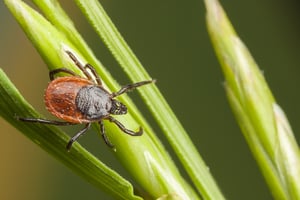Tick control FAQ's
With winter's last grip still holding on tightly, it may be hard to imagine warmer days ahead. But in the final weeks of winter, we're already deep into the planning of our strategy for Massachusetts tick control, and  we're not alone. Our team at Burgess Pest Management has already been receiving requests for tick control, as well as general questions about our methods. That's why we wanted to share an abbreviated version of our Massachusetts tick control FAQ's.
we're not alone. Our team at Burgess Pest Management has already been receiving requests for tick control, as well as general questions about our methods. That's why we wanted to share an abbreviated version of our Massachusetts tick control FAQ's.
Do you recommend wearing insect repellents for protection against ticks?
We always defer to the Centers for Disease Control (CDC) for guidelines on acceptable insect repellents for ticks. In general, the CDC recommends wearing EPA-registered repellents containing DEET, picaridin, IR3535, Oil of Lemon Eucalyptus (OLE), para-menthane-diol (PMD), or 2-undecanone. For more detail, as well as information on acceptable ages of children to wear insect repellent, please refer to the CDC's website, which you may find here: https://www.cdc.gov/ticks/avoid/on_people.html
Are there areas of my yard that are more prone to tick activity?
Generally, ticks are most commonly residing in areas with tall grass, brush surrounding yards, piles of debris, and dark wooded areas. It is possible to find ticks within your lawn, but the higher likelihood is to encounter them in more natural, less manicured areas of your property.
Aside from professional treatments, is there anything I can do to prevent ticks from coming onto my yard?
There's nothing you can do to guarantee you'll never encounter a tick on your property. However, there are several steps you may take to reduce your exposure. Here are some tips:
- Mow your lawn frequently
- Remove leaf litter
- Clear tall grass and brush surrounding your lawn
- Maintain a tick barrier. This is a 3-foot wide zone of crushed stone or wood chips dividing your lawn from natural brush and vegetation
What are some common tickborne diseases I should be concerned about?
Below, you'll find three tickborne diseases along with corresponding links to the CDC, where you'll find more extensive explanations and guidelines.
What do your tick treatments entail?
Burgess Pest Management treats with products that include environmentally-friendly, low-impact, and organic options. We use high-power hydraulic sprayers, mounted onto the back of large trucks. This is important because we adjust the pressure and droplet size to ensure it's powerful enough to kick up the underbrush and coat the backside of leaves and other debris. Treatments are generally spaced approximately every 3-4 weeks, which helps to maintain effectiveness, even in inclement weather.
How much does a treatment cost?
There is not a uniform price for all properties because we need to measure your treatment area. Determining factors include the size of your yard, but also any natural or man-made barriers that will influence our treatment. But to give you an example, and a close idea, most of our customers are already enrolled in a Pad Protection Plan, which covers you for Massachusetts tick and mosquito control (plus many other pests) for as low as $59 per month.
To learn more, click the tab below.


